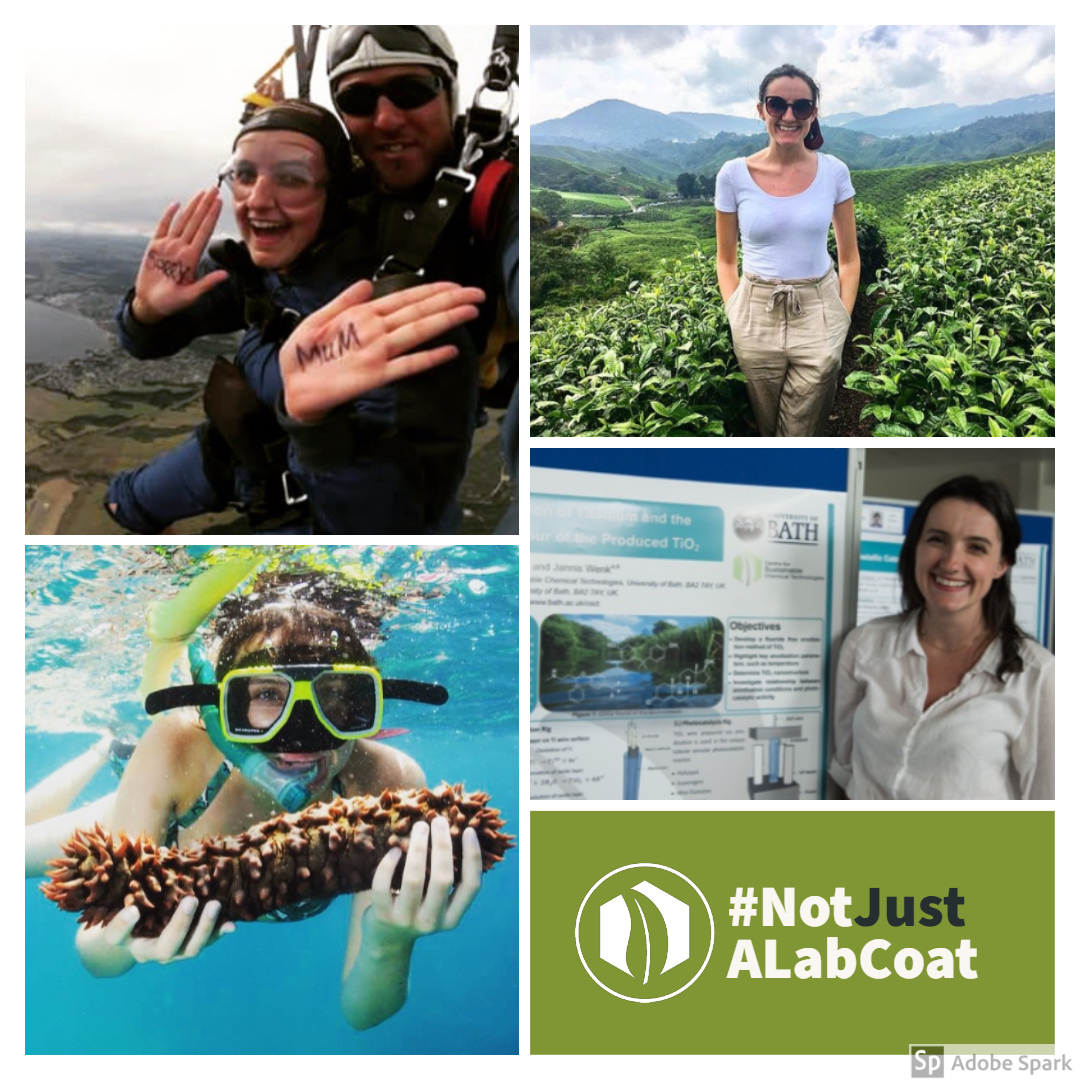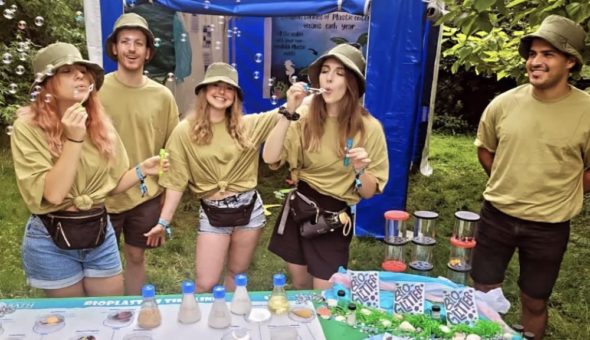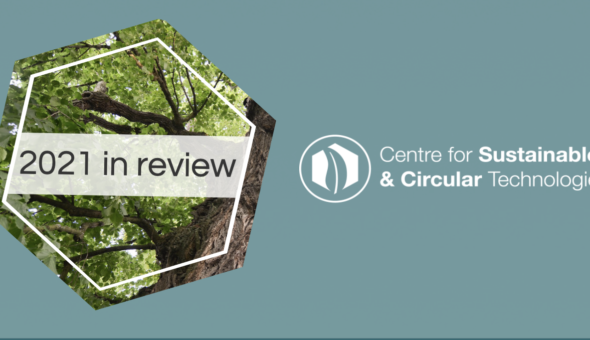Meet Caitlin Taylor, a CSCT student on the final year of her PhD with a self-reported obsession with finding photocatalysts in everyday products. After graduating at the University of Bristol with an MSc in Chemistry, her sense of curiosity took her away to roam around the world — only to find out that she couldn’t stay away from research.
At the CSCT, Caitlin works with Professor Davide Mattia and Dr Jannis Wenk to remove endocrine disruptors — chemicals which interact with human or animal hormones — from wastewater. She is also a bit of a history nerd and a recovered ballerina who enjoys the occasional board game.
What brought you to the CSCT to study sustainable chemical technologies?
Climate change is the greatest challenge the human race faces, and the only way to combat that is to become a sustainable society.
I also really wanted to work in an area of research that was very applied, and what stood out to me about the CSCT was how every area was based on real-world problems. I liked that in the first year we had different research projects and modules to choose from, and the emphasis that was put on courses such as public engagement to develop ourselves as more well-rounded researchers. The centre also stood out to me because of how friendly everyone was at my interview, and what a team atmosphere there was.
What was the reason you chose focussing on water research?
I actually came to the CSCT with my heart set on working in healthcare but, in the first year, you are required to do two different projects. One of the projects I picked was healthcare-related, but the other one was based in chemical engineering centred around water treatment.
Like many people, I had honestly never thought of water treatment before. It is one of the largest engineering processes you can imagine, and something we often take for granted. I found the project — and the topic as a whole — fascinating, and really enjoyed moving into a different field (from organic chemistry to chemical engineering).
So, what do you do at the CSCT?
My research involves using photocatalysis to treat wastewater. A photocatalyst is a light-activated substance that enhances or accelerates a chemical reaction. Specifically in my project, these photocatalysts are Titanium dioxide (TiO2) and Zinc oxide (ZnO). They are often found in sun cream, toothpaste, paint, food, make-up… basically everywhere (I look out for them because I’m a bit sad).
I aim to use my photocatalysts to remove complex chemicals in wastewater that are difficult to eliminate using conventional water treatment methods, such as hormones, pharmaceuticals or pesticides. These chemicals can cause a bit of trouble if they are not properly removed from wastewater and end up entering the environment. For example, hormones can lead to the feminization of fish, potentially leading to the collapse of fish populations. Another example you might have seen in recent headlines involves eels being high on cocaine in the Thames.
What have you found challenging throughout your PhD?
Accepting that I don’t know it all and setting my own limits, e.g. I’ll never feel like my PhD is finished!
Anything of note to mention as a member of the Web Committee?
Working in the Web Committee has been one of the real highlights of my time in the CSCT. We write for the blog, contribute to the CSCT’s social media channels, and meet regularly to discuss ideas for different online campaigns.
Being part of one of the committees mean you get to know the other cohorts, and I’ve really enjoyed brainstorming with the rest of the committee (even if some of our more ‘out there’ ideas do not make the cut). It’s helped to develop my understanding of public engagement and pushed me to produce and edit content. It also includes some great moments, such as chasing members of your cohort down corridors when they know they owe you a blog (sorry guys).
You took a gap year before you started your PhD. How did this affect the prospect of doing a PhD?
After I graduated in 2014 with my MSc, I was in desperate need of a break from academia and had no real idea what I wanted to do (but I was pretty sure it wasn’t a PhD). During this time, I travelled around Australia/New Zealand, as well as Fiji and Hong Kong. I also moved to Berlin for 3 months, to desperately improve my German, and it did get slightly better. However, after travelling for a bit I realised I did miss the lab and research!
I was quite nervous when I first started because, after taking a year off, I was convinced I had forgotten everything I had ever learnt. Of course, that wasn’t the case and the MRes I took during my first year at the CSCT acted as a great way to settle in at Bath and back into research. I think taking a year out is a great opportunity to take a break (because academia is hard!) to not rush decisions. And hey, it may be a chance to find yourself...? #gapyah
Best tip received as a PhD student?
“PhD stands for Doctor of Philosophy — It’s a thinking game!”
It made me relax. We can get so panicky and obsessed with getting the “perfect” data, but hearing this made me take a step back and realise we’re specialising in thinking and understanding the field. Your PhD is about your development, just as much as your reactor/experiment/product.
Another great one was “Learn to say ‘I don’t know’. A lot.”
Who are your mentors, or who are you inspired by?
I work with Dr Jannis Wenk and Professor Davide Mattia, who have been really wonderfully supportive throughout my PhD. They have definitely pushed me to become a better researcher and I’ve been so lucky to have them in my corner.
My mum did a science degree in the 1970s and she had a difficult experience, in part due to being one of the few females within a predominantly male department. Therefore, I find it is really inspiring and progressive to be surrounded by so many female academics who are represented at every level at Bath.
Something you didn’t expect about the ‘PhD life’?
How common imposter syndrome is, even among professors. So many people are waiting for that tap on the shoulder to say “we’ve made a mistake — you’re not meant to be here”. But we all are.
During ‘moments of darkness’, what made you smile?
Having a real wonderful support network in and outside of university life (or just going to the campus coffee shop). #cheekytiki
What does like look like after the CSCT?
There’s life after the CSCT?
I’m going to take another break abroad (might find myself this time), but I plan to stay working in the water industry in some way. I haven’t planned too much ahead, I’m just excited to write up and hand in right now!
What will be your best PhD memory?
Making really wonderful friends. For more specific memories... they’d have to be the summer showcase ceilidhs, and the very few times I got a eureka moment that got me so excited that I had to run to tell someone.
What are your top 3 board games?
1.) Articulate — obviously
2.) Go for broke — It’s the opposite of Monopoly, you have to lose money (and as a PhD student I’m great at that). Nothing like hearing that the stock market has crashed and have half the table erupting in delight.
3.) Linkee — In teams, you have to work out the link between “random” answers.
What other things do you enjoy doing when you’re not PhDing?
Reading really dry history books, watching Love Island and skiing.
Fun facts about you?
I studied ballet for 10 years and used to be trained in pointe (not sure my toes could hack it anymore).
Also, just like my fellow Cohort '15 member, Isabella Poli, I am absolutely terrified of birds (chickens are by far the worse).
Respond




